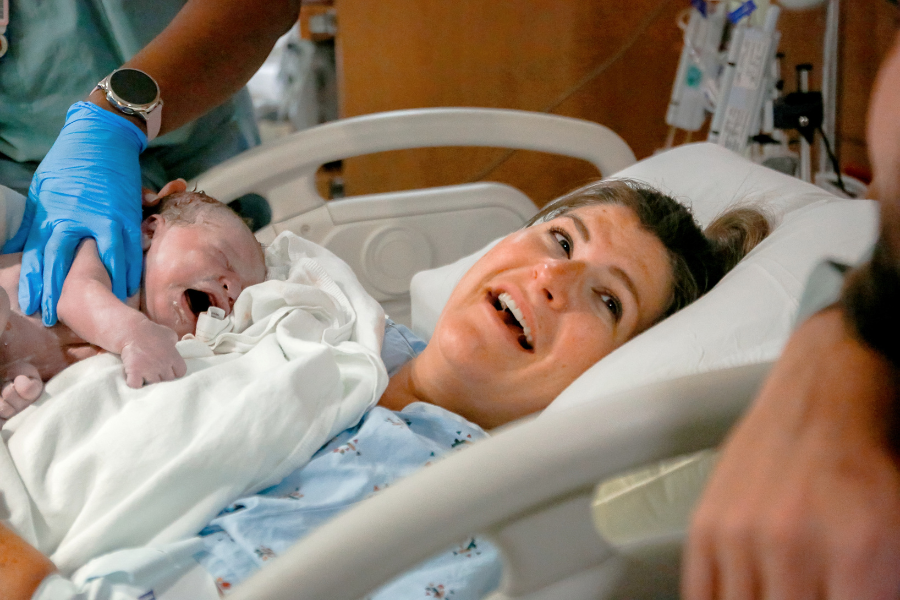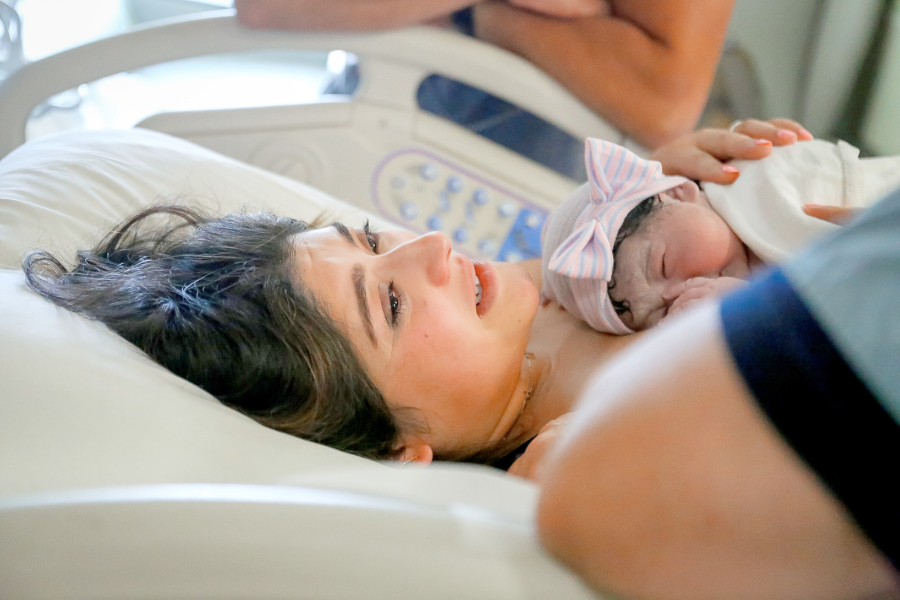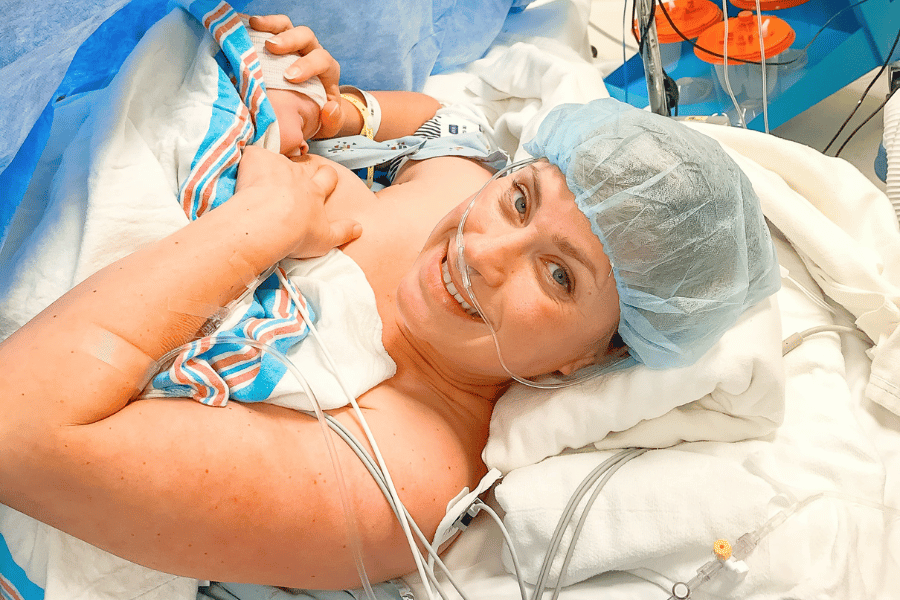I’m sure you are familiar with a lot of the more common myths about pregnancy. And if you are anything like me, you are probably sick of hearing people tell you what you can and cannot do during pregnancy! I felt like there were so many “rules” it was hard to keep up with them all.
Today I’m going to break down 10 of the most common myths about pregnancy. I’ll cover why the myth exists, the truth surrounding it, and pertinent facts and details.
Come along with me mama, let’s set the records straight!
- Myth: You shouldn’t drink coffee during pregnancy
- Myth: You shouldn’t take Tylenol while pregnant
- Myth: You shouldn’t dye your hair during pregnancy
- Myth: You should be eating for two while pregnant
- Myth: You shouldn’t have sex during pregnancy
- Myth: You can’t take hot baths during pregnancy
- Myth: Babies move less the bigger they get during pregnancy
- Myth: You shouldn’t eat sushi during pregnancy
- Myth: You shouldn’t fly during pregnancy
- Myth: Your morning sickness will end after your first trimester
Follow @mommy.labornurse on Instagram to join our community of over 650k for education, tips, and solidarity on all things pregnancy, birth, and postpartum!
Myth: You shouldn’t drink coffee during pregnancy
The reason we get concerned when it comes to caffeine consumption in pregnancy is because caffeine crosses the placenta. What’s more, it increases maternal catecholamine levels.
Catecholamines, hormones made by the adrenal glands, are released in response to stress. The type of catecholamines that you are likely most familiar with are epinephrine, norepinephrine, and dopamine.
Because of this potential link, concerns have surfaced about a possible relationship between caffeine exposure and the incidence of spontaneous miscarriage or preterm birth.
According to The American College of Obstetricians and Gynecologists (ACOG), there is not a connection between moderate caffeine consumption in pregnancy and miscarriage or preterm birth (source).
What then is moderate caffeine consumption? That is an excellent question! Moderate (at least for pregnancy intents and purposes) means less than 200 mg per day. This is about what you will find in your average 12 oz cup of coffee. It is, however, important to remember that caffeine can be found in many other places other than coffee.
Some other common sources include:
- Chocolate
- Soda
- Tea
- Energy drinks
There’s a handy little diagram below that breaks down what 200 mg of caffeine looks like in the above sources!
Myth: You shouldn’t take Tylenol while pregnant
Another popular pregnancy myth: Tylenol consumption during pregnancy. I’m going to reference the experts (ACOG) again for this one, mama.
According to ACOG, there is no clear evidence proving that prudent use of Tylenol during pregnancy leads to fetal developmental issues (source). With a key word here being prudent – this is all under the assumption that you are taking Tylenol according to the instructions.
There are a lot of things that pregnant mamas cannot partake in but don’t let Tylenol be one of them! Take it (as instructed) if you need it!
Myth: You shouldn’t dye your hair during pregnancy
The concern with hair dye and pregnancy is that pretty much all dyes contain chemicals. The data is fairly limited on this, but anecdotally there is evidence that it is generally pretty safe.
According to the Cleveland Clinic, your skin (remember that your scalp also has skin under all that hair) acts as a protective barrier, limiting the amount of chemicals that get absorbed by the body when using hair dye (source).
Many OB providers will recommend waiting until the second or third trimester, when a lot of the big fetal growth and development is complete. But if dying your hair is a must, just err on the side of caution and wait until you are at least 14 weeks along.
Myth: You should be eating for two while pregnant
Is it just me or does it seem to be one of the most frequently used phrases to pregnant women, “Oh go for it, you’re eating for two!” And while there is a sliver of truth here – most women should increase their daily caloric intake during pregnancy – it’s not entirely true!
An “eating for two” mindset during pregnancy can lead to excessive weight gain and possible health complications during and following pregnancy.
According to ACOG, “If you are pregnant with one fetus, you need an extra 340 calories per day starting in the second trimester (and a bit more in the third trimester).” You can hop up to 340 calories in no time, so definitely make sure you are paying attention to food choices during pregnancy!
Related Listening: EP25: Common Nutritional Needs During Pregnancy
Myth: You shouldn’t have sex during pregnancy
I will start by saying the information I am about to give you is for low-risk mamas that have not been advised to abstain from sex during pregnancy.
Now that that’s out of the way, let’s talk about sex during pregnancy and whether or not it’s safe. The short answer is, yes, it is completely safe to have sex during pregnancy.
There are several layers of protection including the uterine muscles, uterus, and amniotic fluid that are keeping your baby safe during sex. So go ahead, mama, and enjoy!
Myth: You can’t take hot baths during pregnancy
Another little luxury people are trying to take away from the pregnant ladies – rude! Good news though, this one is also a myth!
While hot baths are safe during pregnancy, saunas, hot tubs, and crazy burning hot baths should be avoided! What defines crazy burning hot? I’m talking probably hotter than your water heater will even allow – like super uncomfortably hot!
The issue with piping hot baths is that they can raise your body temperature to dangerous levels, not to mention burn your skin and cause dehydration. But baths actually come with a lot of benefits for the pregnant mama, so as long as you haven’t been advised otherwise, don’t hesitate to hop right in!
To learn more about baths in pregnancy, including ways to make your baths pregnancy-safe, click the link below!
Related Reading: Can You Take a Bath While Pregnant? Let’s Debunk This!
Myth: Babies move less the bigger they get during pregnancy
This one is SO VERY FALSE! And if anyone tells you otherwise, even if it’s a medical professional, don’t listen!
Baby’s movements might feel different as they get bigger and their “home” starts to get a little more cramped. But a decrease (or significant increase!) in fetal movement should always be promptly reported and/or evaluated!
You might notice baby’s movements feel more vigorous in that you feel more kicks and jabs versus rolling movements. But remember – different movement is not equivalent to less movement!
So when in doubt, give your OB office a call or go to the hospital to be evaluated if you notice a change in your baby’s movements.
Related Reading: Stillbirth Prevention: Actionable Things You Can Do to Reduce the Risk of Stillbirth
Myth: You shouldn’t eat sushi during pregnancy
You already have to deprive yourself of so many delicacies during pregnancy, don’t withhold sushi too. But before you get super excited about this, there is a bit of a catch!
Sushi has been labeled unsafe during pregnancy because of the risk of foodborne illness, which is increased when consuming uncooked or undercooked foods. Another risk is related to mercury exposure from certain fish.
If you decide to indulge in some sushi, make sure to avoid those fish high in mercury (tilefish, swordfish, shark) and choose options that are fully cooked.
Myth: You shouldn’t fly during pregnancy
First off, I recommend talking to your OB provider before traveling anywhere during pregnancy, especially if it involves an airplane. If you have a low-risk pregnancy, it shouldn’t be an issue but I’m team “err on the side of caution!”
Most domestic airlines allow low-risk pregnant women to fly up to 36 weeks of pregnancy. You can bank on international airlines having stricter policies regarding traveling in pregnancy.
In addition, you should also consider the environment and surroundings of where you will be going. Is there a nearby hospital that’s capable of delivering and caring for you and your baby if you were to go into preterm labor? Any specific virus or illness outbreaks to be aware of (thinking about Zika here)? What about the climate? You catch my drift, right?
And what if you are traveling by car? This isn’t a hard and fast rule, but most experts recommend limiting your road trips (at least the really lengthy ones) once you hit mid-ish third trimester. Not to mention sitting for that long when you are 7+ months pregnant just isn’t comfortable!
I go into more detail in my article below but here are some quick tips to help make travel more comfy when pregnant:
- Stay hydrated
- Wear compression socks to help with swelling
- Take precautions against gas pain
- If flying, book an aisle seat and move around every hour
- If on an extended road trip, make sure to stretch your legs every 1-2 hours
Related Reading: Pregnancy Travel Tips: How to Make Travel Safe and Fun While Pregnant!
Myth: Your morning sickness will end after your first trimester
Don’t shoot the messenger! I’m sorry to be the one to shed truth on this but yes, there are a handful of women that experience morning sickness well past their first trimester and even some unlucky ones that deal with it throughout their entire pregnancy.
For most women morning sickness peaks around 10 weeks and begins to improve around the 13 week mark. This syncs up with the timeline of the placenta taking over hormone production.
Another thing that’s pretty deceiving about morning sickness is the word morning. I know I wasn’t the only one that experienced “morning” sickness at all hours of the day. Any mamas out there want to petition renaming it to all-day sickness?
Check out the post below for some tips to help combat that nausea and vomiting.
I hope I cleared the air for you on some of these pregnancy myth topics. And when in doubt, never hesitate to just quickly run it by your OB if there’s any question about something! Below I’ve included some additional MLN pregnancy resources for you to peruse.
Cheers to an even better birth, mama!






